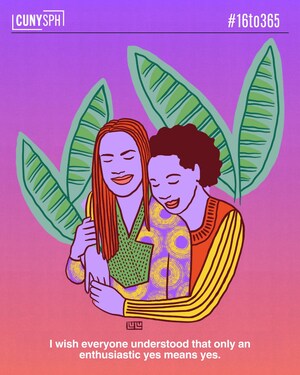New Yorkers believe pandemic will persist, but express hope in wake of Presidential election, latest CUNY poll finds
NEW YORK, Dec. 2, 2020 /PRNewswire/ -- As COVID-19 surges nationwide, 78% of New York City residents believe it is likely or very likely the city will experience once again the high count of cases we saw last April. However, the presidential election appears to have triggered an optimism among New Yorkers: more than half (55%) feel "more hopeful" about the country's economic recovery (55%) and the government's ability to control the pandemic (58%). These are key findings from a survey of public perceptions and experiences in NYC during the COVID-19 pandemic conducted by the CUNY Graduate School of Public Health & Health Policy (CUNY SPH). One thousand NYC residents were polled from November 20-22, 2020. The same panel of respondents were surveyed at the end of September and will be surveyed once more in January 2021.
"As we head into the most challenging winter of our lifetimes, this combination of clear-eyed acceptance of our current reality and cautious optimism bodes well for New York's eventual recovery," says Dr. Ayman El-Mohandes, Dean of CUNY SPH.
Asked whether the recent election influenced their willingness to accept a COVID-19 vaccine, 43% report that it is now more likely that they will accept the vaccine compared to 18% who were less likely to take it. "This post-election boost in vaccine confidence is heartening," says Dr. Scott Ratzan, Distinguished Lecturer at CUNY SPH, "but the number of people who accept the new vaccines will still have to grow substantially if we are to curb the pandemic."
Subtle changes in indicators of mental health and trust
Levels of anxiety and depression were steady from September to November with 21% of respondents feeling anxious more than half the time and 19% of respondents feeling depressed. However, hopefulness for the future is up 11%, with 43% of respondents feeling hopeful more than half the time.
Trust in federal and state government remained unchanged since September, with 23% trusting that the federal government has their best interests and safety in mind, and 38% trusting the state government. Fifteen percent (15%) trust both governments while 14% trust neither. The remaining 10% are unsure.
However, trust in fellow citizens appears to have eroded substantially, dropping 12% since September with only 31% of respondents agreeing that "most people can be trusted."
Economic pain persists
Employment numbers worsened slightly: of those who lost their job due to the pandemic, 48% remained unemployed in September; in November, that number has crept up to 44%. Twenty nine percent of households (29%) ran out of food in November before they had money to buy more, compared to 31% in September. Communities of color continue to be impacted disproportionately: 38% and 34% of Latinx and Black respondents respectively ran out of food in November before they had the money to buy more, compared to 19% of Whites.
Additional survey results are at https://sph.cuny.edu/research/covid-19-tracking-survey/november and JHC Impact, an initiative of the Journal of Health Communication: International Perspectives.
Contact:
Ariana Costakes
646-549-4892
[email protected]
SOURCE CUNY SPH

Related Links
WANT YOUR COMPANY'S NEWS FEATURED ON PRNEWSWIRE.COM?
Newsrooms &
Influencers
Digital Media
Outlets
Journalists
Opted In




Share this article